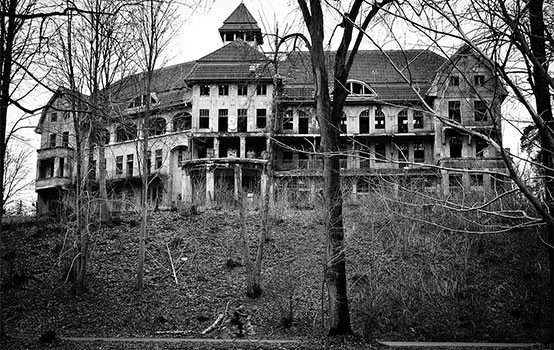The Greatest of Ghost Stories

A museum curator purchases a mezzotint that changes each time he and his colleagues look at it, to depict a child-kidnapping that took place a hundred years earlier.
A travel writer finds himself pursued by a man in a “long black cloak” and a shorter figure “in dark cloak and hood” after he visits a mausoleum in Sweden.
A man, placed under a curse by a malevolent alchemist, puts his hand underneath his pillow to find his matches—but to his horror touches a mouth, with teeth and “hair about it” but that is “not the mouth of a human being.”
Welcome to the macabre and terrifying world of M.R. James, described, accurately I think, as “the best ghost-story writer England has ever produced.”
James died 80 years ago, in June 1936, just three years before the outbreak of World War II. Barring three that appeared in magazines later, all his ghost stories were published in one collection in 1931. And what a volume it is! “Do I believe in ghosts?” James asks in the introduction. “To which I answer that I am prepared to consider evidence and accept it if it satisfies me.”
Montague Rhodes James was the son of an Anglican curate and educated at Eton, England’s most prestigious public school, and King’s College Cambridge, where he studied classics. He didn’t stray too far from these two historic educational institutions in his adult life. He spent 36 years living at King’s, where he was at various points dean, tutor, and then provost. When he was in his mid-fifties, he accepted the provostship of Eton.
It’s been claimed that what James was really terrified of was not ghosts and ghouls but progress. His stories, we’re told, are all about keeping the modern world at bay.
Well, James was a medievalist, paleographer, and biblical scholar, so it’s reasonable to assume he had a particular affinity for the past. But 21st-century hipsters who pass on him because they believe James is too old-fashioned for the iPhone age and consequently has nothing to say to us are missing something really special.
While he may have spent most of his life in a cloistered environment, James was anything but blinkered. He traveled extensively—by bicycle—in Britain and in Europe. The man who became the world’s leading authority on Apocryphal literature and who claimed to have visited all but two of the cathedrals in France was interested in new things too—in his final days his sister Grace revealed that he took great delight in “a radio-gramophone of the latest type,” which his friends had bought him.
Monty James was a convivial sort, as pipe-smokers usually are, and seems to have got on well with almost everybody. His stories are often disturbing, but James himself, despite later claims that he was a repressed homosexual, seems to have been a cheerful soul. He possessed a good sense of humor and was still chuckling away even when he was dying of cancer. He took a lot of things seriously, but, most importantly, not himself. “Do you know, I have written an immense deal of stuff and find myself almost incurably frivolous,” he said in his later life.
Many of James’s stories were first told to his pupils and students, who adored him, in front of a roaring log fire in his study at the old Provost’s Lodge at King’s.
The Encyclopedia of Horror tells us that James established three simple rules for his ghost stories.
Firstly, the ghosts had to be evil. If you want comical spirits who make us laugh, then James is not your man—try H.G. Wells’s The Inexperienced Ghost or just watch Ghostbusters. “Must there be horror? you ask. I think so … you must have horror and also malevolence,” James wrote in 1931.
Secondly, there had to be no “unnecessary occult verbiage” by way of explanation. James’s second name was Rhodes, but the “R” could equally have stood for reticence, which he believed was “not less necessary” an ingredient than horror and malevolence.
Finally, the stories had to be set in everyday surroundings so that the reader believes the same thing could happen to him. Most of James’s hauntings take place in the recent past. “It cannot be said too often that the more remote in time the ghost is the harder it is to make him effective,” James explained.
Although the two men came from very different backgrounds, James had much in common with another very popular writer of the period, the solidly working-class Edgar Wallace. Both were unpretentious artists whose main aim was to keep their audiences entertained. Wallace’s matter-of-fact writing style—honed after his many years as a newspaper reporter—made the most fantastic occurrences seem believable. James lulls us into a false sense of security with his dry antiquarian references and by starting his tales in places that we’d all find safe and reassuring. When the cold hand of fear does touch our shoulder, it’s all the more shocking because of the sheer ordinariness of what’s gone on before.
In “Oh, Whistle, And I’ll Come to You, My Lad,” a university professor sets off for a golfing holiday on England’s east coast. He’s asked by a colleague to look at the site of a Knights Templar preceptory to see if it would be suitable for an archaeological dig the following summer. He finds there a metal tube, about four inches long, which he takes back to the inn where he is staying. Nothing too sinister in that you’d think. But when he blows on the tube, having read on it the Latin inscription Quis Est Iste Qui Venit—“who is this who is coming?”—the most extraordinary things start to happen.
In “The Tractate Middoth,” an elderly man “with a thin face and grey Piccadilly weepers” enters a “certain famous library” and requests an 18th-century Hebrew text from the librarian. What could be more unthreatening?
In fact, it turns out to be one of James’s most frightening tales, with a climax that involves a “little dark form” emerging from behind a tree trunk to strangle his victim.
With James horror can strike at any minute. We often go from the normal to the utterly grotesque in single sentence. In “The Diary of Mr. Poynton,” Mr. Denton is sitting in his armchair and reading. How very comforting! He reaches down to stroke his pet spaniel, or what he thinks is his pet spaniel. “What he had been touching rose to meet him,” writes James: “Of the face which was now rising to within a few inches of his own no feature was discernible, only hair. Shapeless as it was, there was about it so horrible an air of menace that as he bounded from his chair and rushed from the room he heard himself moaning with fear.”
In “The Rose Garden” the rather bossy Mrs. Anstruther is planning some horticultural changes. She’s walking past some garden bushes when she hears a bird rustling and turns her head. She sees what appears to be a “Fifth of November mask peeping out among the branches.” But it was no mask. “It was a face—large, smooth, and pink,” with “clean shaven jaws” and with its eyes shut. “The mouth was open and a single tooth appeared below the upper lip. As she looked the face receded into the darkness of the bush. The shelter of the house was gained and the door shut before she collapsed.” It transpired that the place where Mrs. Anstruther had wanted to put her rose garden was where the Lord Chief Justice of Charles II had been buried.
In the world of M.R. James we really can’t take anything for granted. When reading “The Stalls of Barchester Cathedral,” we get a nasty shock when it’s revealed that a lead character—who we think is purer than pure—was responsible for the death of the 92-year-old archdeacon. But if we go back a few pages, we can see the clues are all there. James may deceive us, but he does so by playing scrupulously fair.
James’s stories were still hugely popular in Britain in the ’70s and ’80s when I was growing up, as were ghost stories generally. I’ve still got a copy of the 1st Armada Ghost Book, published in 1967, which included stories from the likes of Sir Arthur Quiller-Couch and Edward Lucas White. My Collected Ghost Stories of M.R. James has been a companion for almost 25 years.
But in recent years it seems ghosts and traditional ghost stories have fallen out of fashion. Although there’s been the odd television adaptation of James’s work in the UK, I doubt if children today read his stories as I did. Neither is there much talk, at least not in Britain, of specters and ghostly apparitions. Yet things could be changing. Penguin Classics has issued two collections of James ghost stories, while in 2013, Oxford World’s Classics published them all in a single volume.
Would a ghost-story revival really matter? I think it would, a great deal. The lofty late 20th- and early 21st-century dismissal of anything supernatural—indeed anything spiritual—has not only increased egotism (we don’t believe in anything bigger than ourselves), it has arguably made us easier to con and control. In an age where great penalties exist for not holding the “right” views, few dare to express in public beliefs that are likely to lead to them being ridiculed by truth enforcers, many of whom seem to take their cue from the obnoxious Dr. Vergerus in Bergman’s The Magician.
M.R. James admitted that none of his stories was based on direct personal experience, but as noted, he didn’t rule out the possibility that ghosts might exist. Today, I’m sure he’d be widely mocked just for keeping an open mind. But while talking of the possible existence of ghosts is deemed to be silly, we’re expected to accept much sillier propositions, such as the notion that the U.S. and UK—whose leaders tell us that we need to have weapons of mass destruction because they deter attack—attacked Iraq in 2003 precisely because that country possessed weapons of mass destruction.
 It’s been said that once Man stops believing in God the danger is not that he’ll believe in nothing but that he’ll believe in anything. That could be broadened to say that once we stop believing in the possibility of the supernatural, we’re more likely to lose our capacity for critical thought.
It’s been said that once Man stops believing in God the danger is not that he’ll believe in nothing but that he’ll believe in anything. That could be broadened to say that once we stop believing in the possibility of the supernatural, we’re more likely to lose our capacity for critical thought.
It’s also important that, from time to time, for the good of our souls and our morale, we read literature that scares the living daylights out of us. If we allow ourselves to be pleasantly frightened by ghost stories and the supernatural, it is harder for politicians to scare us, whether with bogus Iraqi WMD, a nonexistent threat from Russia, or the fear that ISIS will kill each and every one of us. Read James’s “Casting the Runes” and, I assure you, you won’t be frightened of anything a neocon will tell you ever again.
Ghost stories, by getting us to think about the possibility of “the other world,” help us to put everything into its proper perspective. To believe that there are, or could be, “more things in heaven and earth” is truly life-enhancing. It also, I think, makes us nicer people: less cocksure, more humble.
Neil Clark is the author of Stranger Than Fiction: The Life of Edgar Wallace.
Comments